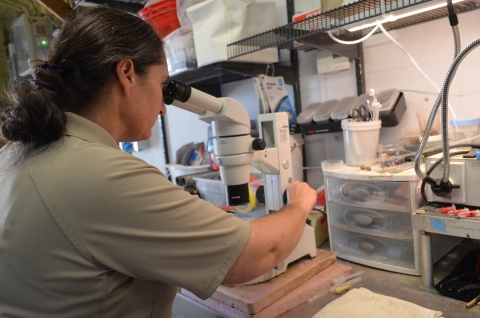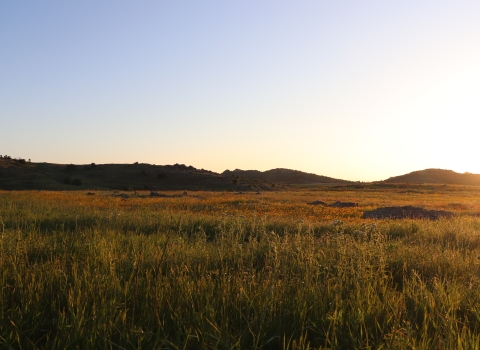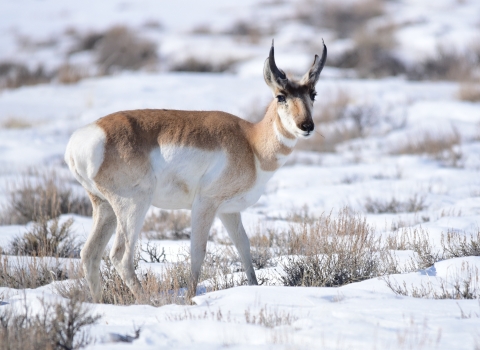We at the U.S. Fish and Wildlife Service know that when humanity comes together, nature thrives. That’s the case with freshwater mussel in the midwest. Did you know the midwest has long been known for its expansive farmlands, winding rivers and the deep-rooted communities that have thrived on its abundant resources? Yet, nestled within this vast expanse lies a conservation marvel that is slowly, but steadily, revitalizing one of nature's unsung heroes – freshwater mussels. Take a moment to learn about these resilient animals.
Their unique life cycle involves a symbiotic relationship with specific host fish, where their larvae attach to the fish's gills for a phase before maturing and settling to the riverbed. In their lifetime, mussels act as nature's purifiers. They sieve out impurities from water, enhancing clarity and quality. Moreover, they play an active role in nutrient cycling, which benefits the aquatic ecosystem at large. Their decline would not only impact water quality but also disturb the balance of aquatic life.
As we mark the one-year anniversary of the Inflation Reduction Act, there's no better time to shine a spotlight on the midwest's contributions, particularly those of Genoa National Fish Hatchery, toward mussel conservation.
Meet Megan Bradley, a freshwater mussel biologist in Wisconsin. Megan's journey in the world of mussels is as riveting as it is impactful. From her early days having a go in mussel work in Virginia during high school and college, to her advanced research in Missouri, she has been instrumental in steering the conservation compass toward these aquatic wonders. Now, with 17 years of experience under her belt, she's at the forefront of this mission, championing the cause of freshwater mussels for the U.S. Fish and Wildlife Service.
Genoa National Fish Hatchery's role
Genoa National Fish Hatchery in Wisconsin stands as a beacon of hope and innovation in mussel conservation, receiving a dedicated allocation of $100,000. The hatchery's prime project revolves around the new mobile aquatic rearing system. Under the guidance of Hatchery Manager Doug Aloisi, the hatchery team includes Wildlife Biologist Beth Glidewell who’s diving deep into innovative projects, with the aim of rehabilitating and expanding habitats for almost 20 endangered species of freshwater mussels. The hatchery’s connection with the Upper Mississippi River, a prime habitat for big river mussels, offers a strategic advantage.
In the outcome of the Inflation Reduction Act, funds were directed toward the Midwest Region, with the hatchery being a pivotal research focus. Two major projects have been initiated. Firstly, the creation of a new mobile aquatic rearing system, which was designed with sustainability in mind. This mobile system is equipped with solar panels which will be paramount in simulating the natural river conditions that are crucial for mussel growth. The second project focuses on renovating a resource building. This endeavor aims to expand on-site mussel cultivation capabilities. The tireless efforts of the hatchery’s maintenance staff, Jeff Lockington and Zach Kumlin, who craft their own equipment, including specialized filters that are tailored to the unique needs of a given mussel species.
But beyond these tangible projects, the core of the hatchery's mission lies in the myriad partnerships it has forged. From collaborating with the Saint Regis Mohawk Tribe in New York and the National Park Service on the Cuyahoga River, to addressing natural resource damage assessments, the scope of Genoa National Fish Hatchery’s efforts is vast.
The genetic catalog - A step into the future
A monumental initiative that stands out is the development of a genetic catalog for freshwater mussels. Spearheaded by the Smithsonian Institution, this project aims to archive genetic material from all 297 North American mussel species. This massive endeavor will not only fast-track genetic research, will also play a critical role in developing recovery plans and will shave off years from the usual timeline of such endeavors.
This shared database, which could potentially incorporate contributions from the United States Geological Survey and states, would be invaluable for conservationists and researchers alike. By providing access to genetic data, it ensures that management decisions are informed, accurate and timely.
The road ahead
The journey, however, is not without challenges. Invasive species like black carp, which feed on mussels, pose a considerable threat. To address such challenges the regional mussel team, which convenes monthly, plays an instrumental role in sharing knowledge, discussing projects and brainstorming solutions.
As we look back on the year that was, it's clear that the Inflation Reduction Act has been more than just a legislative measure. It's a testament to the power of collective effort. Whether it's the meticulous planning at Genoa National Fish Hatchery, the expertise of Megan Bradley or the shared vision of numerous collaborators, this journey underscores a singular truth - when humanity comes together, nature thrives.
As mussels find their way back into American waterways, they carry with them not just the hope of a species, but also the aspirations of countless individuals who believe in a balanced, harmonious and thriving ecosystem. And as the waters of the Upper Mississippi River gently cradle these mussels, you can't help but feel optimistic about the future – a future where people and mussels coexist, prosper and flourish for generations.
Learn more about Genoa National Fish Hatchery






